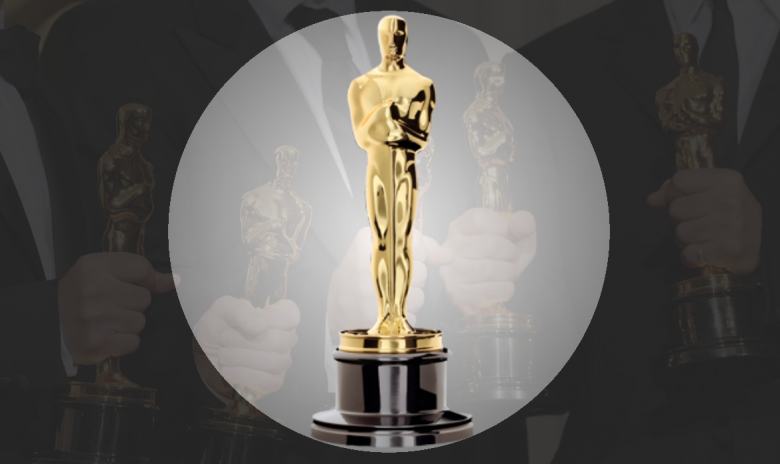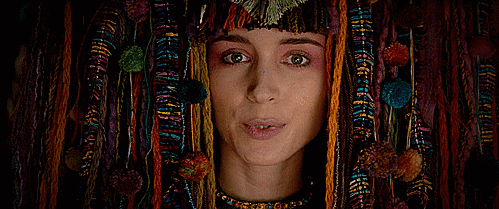
Opinion: The Oscars Are Behind And Dragging Us Back With Them
“We still have a serious problem on our hands” writes Marie Kelly.

The Oscars, for two years running, has featured nominated people who are predominantly male, white, with names that are fairly easy to pronounce. It’d be a cute mistake, if it wasn’t a serious misrepresentation of the world of film and television, or a complete misrepresentation of the world itself.
The Academy Awards’ nominations in varying categories have spurred the hashtag #OscarsSoWhite for the second year now, and it’s time we explored why.
Now, before you go all Charlotte Rampling on me and tell me that fighting for a diverse voice at the Oscars is “racist to whites” or even “sexist to men”, let’s get a few things straightened up.
Sexism and racism are forms of oppression.
Before most of our readers were born, women, but more importantly, people of colour, had been fighting for a right to be recognised as fellow humans, the step that must be conquered before being recognised as an equal. Think about it this way, with all the history of racism, slavery and injustice that has happened to people of colour over centuries, the majority of society only allows to teach this or even recognise that history in one month.
Even women only got the right to vote in some countries half a century ago, and in some countries they are not allowed to learn and are forced to pay a tax on supplies for a bodily function that is impossible to control (see: tampon tax).
In the classroom of inequality, when asked to try and fly a paper plane to the front of the classroom in one go: white people sit in the front row, whilst many people of colour are still trying to reach the front of the classroom from the back row. One cannot be oppressed if they are in a seat of privilege (the front row in the classroom analogy), and for most of Hollywood, the seat of privilege belongs to (everyone say it with me) older, straight, white males.
If anything the statistics of the Academy voters are a complete reverse of who is watching the films that are being produced lately. On top of that, it’s starting to become the reverse of the worlds that are depicted in the films that they vote on.
Unequal representation in film and television, particularly awards for film and television, has been looked over for a very long time. Brushed off the shoulders of privileged actors, most of whom have made their fame through nepotism, with the phrases “if people of colour want awards, they need to make films featuring people of colour”, “it’s not that we don’t like female directors, there just are none”, and “maybe Hollywood isn’t ready for films about women or people of colour“.
Though, I still feel like the worst quote on inequality in film comes from SNL’s executive Lorne Michaels:
“It’s not like it’s not a priority for us. It will happen. I’m sure it will happen. You don’t do anyone a favor if they’re not ready.”
If equality in film and television is looked upon as a favour, then people, we still have a serious problem on our hands. On top of that, if a niece or nephew of Michaels was to ask if they could be involved with SNL and have no prior experience, would he say no or would he do them a favour? Something to think about.
[easy-tweet tweet=””When it comes to The Oscars, we still have a serious problem on our hands”” user=”TheVineOnline” hashtags=”Oscars”]
Samuel L Jackson said it best in A Time To Kill (1996), as a black man on trial with a jury full of white people and in a room with white lawyers; “How’s a black man ever going to get a fair trial with the enemy on the bench and in the jury box? My life in white hands?” Now I chose this quote from this film specifically because it got Jackson a nomination for Best Supporting Actor for the Golden Globes in 1997, a win at the BlockBuster Entertainment Awards and the Image Awards for Best Supporting Actor. However, when it came to the Oscars, Jackson was completely overlooked.
Well, that’s the thing, recent studies on the voters at the Academy unearthed:
- the Academy voters have a ratio of 94:6 caucasian to “other” voters – other including black, hispanic and asian;
- the Academy voters are 77% male and 23% female;
- the Academy voters are mostly old, with 54% of voters over the age of sixty.
This is a huge misrepresentation of film goers and film watchers, as studies show that only 54% of frequent movie goers in 2014 were caucasian, 25% were hispanic, 10% were black, and the remaining 9% fell under Asian or “other”. The study also showed that between the years 2012 and 2014, that the male to female ration of filmgoers sat dead on 50/50, there was any sway, it tended to show that 52% of film goers were female and the remaining 48% male.
As for the strange skew in the age dynamic of Oscar voters and film goers, the study reads:
Young people in the 12-17 and 18-24 age groups continue to oversample relative to their portion of the population. The 12-17 age group represented 11% of moviegoers and 14% of tickets sold in 2014, compared to only 8% of the population. 18-24 year olds represent 10% of the population, but 13% of moviegoers and 16% of tickets sold.
When we look at the films that have come out in the past year and other film awards that have happened prior to the Oscars, we can see that there is a serious case of misrepresentation, primarily at the Oscars.
When it came to the Golden Globes, which took place at the start of 2016, we had some variation, not just in the colour of the people nominated, but also in their body shape and their experience as stars of the big screen, and the small screen too.
The Screen Actors Guild Awards, which took place on the 30th of January, had a large amount of diversity not just in the nominations, but also in the winning categories; with Idris Elba taking home Outstanding Performance by a Male Actor in a Supporting Role in a Motion Picture and Straight Out of Compton receiving a nomination for Outstanding Performance by a Cast. When it comes to television awards for actors, Viola Davis, Idris Elba, Uzo Abuda, Oscar Isaac and the cast of Orange Is The New Black recently took out several awards for their performances.
This year’s nominees for the Academy awards have really highlighted how behind the Academy is:
- No female directors nominated.
- No actors of colour nominated for best actor or best actress.
- In the categories of best supporting actor and best supporting actress, all the nominees are Caucasian.
- An important film about women and sexuality, Carol, was ignored for the category of best film.
- The category for best cinematography features only men as nominees.
- The categories that show some diversity are best adapted screenplay, best editing, production design, documentary (short and feature) and costume design.
- The first and only transgender artist to be nominated for an award, Anohni, Oscar Nominee for best song (“Manta Ray” with composer J. Ralph) will not be attending the Oscars because of how they have been treated by The Academy and its organisers.
The 2016 Academy Award nominations are even less diverse than the previous year, because at least the biopic Selma about Martin Luther King was nominated for Best Picture. But still, the category for Best Director was entirely male and the awards for the stars of the screen were largely caucasian.
However, Eddie Redmayne did cop some slack for winning an award when performing as an able bodied person representing a person with a disability in The Theory of Everything.
The same might go this year as he is playing a transgender character in The Danish Girl whilst being a cisgender male.
The team at Saturday Night Live even came out to shun the 2016 nominations in a recent sketch. In the sketch they didn’t hold back on pointing out the plethora of African American narratives being told on the silver screen and the lack of recognition given for black actors.
Following calls to boycott the Oscars due to a complete lack of diversity in this years nominations, their sassy clip highlights just how ridiculous Hollywoods ‘night of nights’ has become. In particular, they pointed their gun of shame at Sylvester Stallone’s nomination for his role in Creed, because if anyone in that film deserved an award it was the leading black actor, Michael B Jordan.
The SNL crew also gave a shout out to black actor Idris Elba for his role in Beasts of No Nation, which he has not received an Academy nomination for.

They even topped it all off with a big hit at the category for best director, with the voice over announcing:
“up next, the category of best male director… I mean, best director”.
Other actors, of varying racial backgrounds and genders have also spoken out against the clear white washing of the nominations for the awards; such as George Clooney and Hugh Jackman. But Mr Clooney, don’t you run a production company? Why aren’t you hiring non-caucasian actors and off-screen team members? Huh? Huh? Old mate Jackman, however was much astute with his surveying of the realm of film and television;
“Not just race – sex, sexuality, every front, films are there to tell the stories of our time… [They] need to reflect the world, the real world, and so it’s a great conversation to have… I think actually Hollywood’s in a great position right now to be able to lead the way…”
As Mr Jackman has brought up sexuality, we need to seriously consider why, as said by Sir Ian McKellen, that no openly gay man has won an Oscar, yet straight men (Tom Hanks, Philip Seymour Hoffman & Sean Penn) have won and will continue win Oscars for playing gay men. Sir McKellen was nominated for two Oscars, one in 1998 and the other in 2002, however didn’t win either of them.
“No openly gay man has ever won the Oscar; I wonder if that is prejudice or chance… How clever, how clever… What about giving me one for playing a straight man? My speech has been in two jackets … ‘I’m proud to be the first openly gay man to win the Oscar.’ I’ve had to put it back in my pocket twice.”
That’s another backward example to consider when listing the yays and nays of whether or not this Academy and industry is falling behind. Straight men awarded for playing gay men, cisgender actors happily playing transgender people or characters, white men applauded for playing Latino, Egyptian, Asian or Black men – in fact, some of these white actors and actresses have won awards for playing a role outside of their race. Remember when Angelina Jolie played a black woman? No one had a problem then, but as soon as John Boyega is cast as a storm trooper in Star Wars VII: The Force Awakens, people call for a boycott of the film.
Let’s not forget what has been happening with Gods of Egypt and Exodus, where casting agents and directors have specifically chosen to ignore geographical facts and history. Last time I checked, Gerard Butler is from Scotland, not Africa.
Movie, #GodsOfEgypt in which everyone is white? Egyptians, in history and today, have NEVER been white. BRING BACK GEOGRAPHY!! It's Africa!
— Bette Midler (@BetteMidler) November 12, 2015
“There aren’t roles for people of colour”? Open your eyes Hollywood. You cast Emma Stone as a part-Asian woman in Aloha and had absolutely no problem with casting Rooney Mara as the Native American character Tiger Lily in Pan. Well, Rooney Mara didn’t have a problem… until #OscarsSoWhite started trending.

Fake tan and heavy makeup does not a make an actor a person of colour, nor does it change their race. In fact, it’s basically blackface and pretty darn racist.
Ladies and gentlemen, this is what I like to call double standards or extreme hypocrisy. How can one happily ignore the casting of white people to play historically non-white people (I’m talking true stories here), but get enraged when someone decides that the title character from the musical Annie is played by a young person of colour?
Oh, wouldn’t it all be so much easier and simpler if Hollywood just cast people of colour in roles that clearly exist and were written for them, without worrying which white actor will bring home the bacon?

The BET Awards, were in fact created so that people of colour in the United States were getting recognition for their work on screen and behind the screen. If people of diverse backgrounds have to create their own award programs to get any recognition for their hard work and their efforts to show people of similar backgrounds success stories; then the mainstream award shows have some serious re-structuring to do.
Otherwise, why else would a mainstream award be labelled to be the “white” version of a minority’s award?
The #Oscars. The White BET Awards.https://t.co/8qjLR0uysI
— Chris Rock (@chrisrock) January 15, 2016
The Academy’s President, Cheryl Boone Isaacs, has also come out to say that she is “heartbroken and frustrated” by the lack of inclusion and diversity in the nominations for the awards. She claims that over the past four years the Academy has been moving to “diversify” their membership base but the changes aren’t happening as fast as she would like.
Luckily, the Academy is also striving to rectify the lack of diversity in their awards by balancing out the presenters and performers at the awards show.
Benicio Del Toro, Tina Fey, Whoopi Goldberg, Ryan Gosling, Kevin Hart, Sam Smith, Jacob Tremblay, The Weeknd, Pharrell Williams, Charlize Theron and Lady Gaga have all been recently confirmed as presenters and/or performers on the night of nights for 2016. Which is fantastic because that means the Academy has ticked off the boxes for hispanic, black, homosexual, a woman over 50 and a child.
So, who exactly are the Oscars’ voting population speaking for these days? They don’t appear to be speaking for the Academy’s President, nor are the speaking for the majority of filmgoers, nor many stars on and off the screen. Do the voters of the awards know or understand how backdated their thinking is? If this year’s award nominations are less diverse than 2015, they may not be aware of how stagnant their thinking is.

Look at all the changes that are happening in the world on our screens, in our homes and on our streets:
If Target are able to represent kids with disabilities in their catalogues, Orange is the New Black has cast a transgender actor (Laverne Cox) to play a transgender character, Lego have created a disabled character in their new collection, Star Wars: The Force Awakens’ main cast includes a female, a hispanic male and a black male, Sicario shows the partnership of a black male cop and a caucasian female cop, Elementary cast an asian woman to play Dr Watson, Madame Secretary and House of Cards both show powerful older women, Viola Davis plays a matriarchal character in How To Get Away With Murder – then one can conclude that these are things we want to see in the media because it’s what is in the real world.
This also shows that the television industry is moving faster than the film industry. Ever since the introduction of Netflix and other sites for streaming television or web series, we’re seeing a broader range of characters and stories. This is another reason why The Oscars and The Academy are lagging so far behind; they do not recognise television personalities.
Their only focus is film. If film is behind, then the Academy will remain behind the times too. A never ending circle of trouble, because winning an award is seen as encouragement to continue, and being ‘snubbed’ is seen as a put down, rather than a challenge.
To quote Master Of None‘s producer Alan Yang, when receiving the 2016 Critic’s Choice TV Award for Best Comedy:
“Thank you to all the straight white guys who dominated movies and TV so hard, and for so long, that stories about anyone else seem kind of fresh and original.”
There are facts of life that we have to face in our world, the real world, the world we live in: people of colour exist. Women exist. People with differing abilities and ‘non-traditional’ sexualities or gender identities exist. They deserve to be shown and represented in films, television and award programs because they exist.
There are women and other people of colour working their butts off to get recognised on screen and behind the scenes. There are societies put together to make sure that minorities are recognised and get support in film and television, in the hope that they will have some success.
It’s that word that is the problem: minority. It’s been demonstrated again, again and again, that groups that are considered minorities, have an equal (if not larger) population that those whose voices we hear the most. Women and people of colour or different ethnicities to caucasians are not a minority, it’s the fact that their voices are being ignored that makes them minor.

